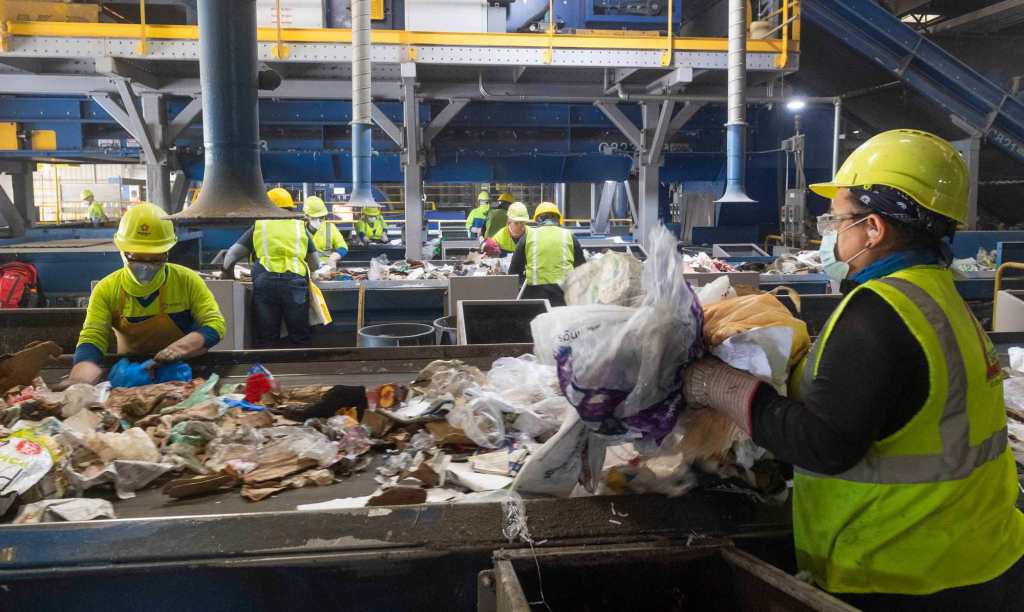Why you might not get plastic utensils next time you go to a California restaurant – Times-Herald

Long-standing question in many restaurants: “So do you want french fries?” May soon be combined with a new one: “Do you want plastic with it?”
Late Tuesday, Governor Gavin Newsom signed nine environmental legislation aimed at reducing waste, toxic chemicals and plastic waste.
Among them are measures that prohibit restaurants and food delivery services from distributing plastic forks, knives, spoons, straws, chopsticks, and even ketchup and mustard sachets unless requested by the customer. The goal is to end the habit of restaurant employees automatically throwing plastic cutlery and seasonings into takeaway bags. This is an item that is often thrown away when people go home.
invoice, AB 1276Written by Assemblywoman Wendy Carrillo of D-Los Angeles, California State Legislature’s latest attempt to reduce plastic pollution and other debris in rivers, streams, and oceans.
Nick Lapis, advocate for Californians Against Waste, a non-profit organization in Sacramento, said: “In the past, it was common to give disposable utensils when feeding, but eating at home no longer makes sense. People have metal cutlery at home.”
The bill was endorsed by the Sierra Club, Surfrider Foundation, League to Save Lake Tahoe, Monterey Bay Aquarium Foundation and other environmental groups.
The California Restaurant Association took a neutral position after working with supporters on some changes as the bill passed the state legislature. The association called the measure a “good faith bill” and said it “promotes a cause that all of us can support: waste reduction.”
By June 1, 2022, new state-wide legislation will ensure that restaurant warnings for the first two violations and a $ 25 per day fine for subsequent violations do not exceed $ 300 per year. It is accepted.
“This is the lowest hanging fruit,” Lapis said. “If you don’t even want a disposable plastic product, you don’t have to get it without asking for it. It doesn’t rob anyone who wants it, but it removes what people don’t want.”
This measure allows restaurants to continue to serve bulk seasonings such as ketchup and mustard, along with plastic or metal utensils in refillable containers.
Plastic pollution is a growing problem in California and around the world. Volunteer California’s Annual Coastal Cleanup Day from 1988 to 2017 picked up 1.9 million straws, utensils, cups and dishes from state beaches, streams and rivers.
Half of the plastics that ever existed on Earth were manufactured after 2002. Only 9% of plastics sold annually in the United States Is recycled..to 13 million metric tons One of them flows into the world’s oceans every year. This is equivalent to being filled with garbage trucks and dumped into the sea every minute. There, fish, birds, sea turtles, whales and dolphins eat and entangle and kill them.
In 2016, California voters approved Proposal 67, a state-wide voting bill, banning disposable plastic shopping bags, which does not use meat, bread, agricultural products, bulk foods, or fresh foods. It was still allowed.
Environmental groups have recently passed new legislation requiring companies that manufacture plastic packaging (from fast food containers to packaging that puts toys and other products in cardboard boxes) to retrieve materials without success in the state legislature. We are promoting the elimination. Set up a recycling program.
They were rejected and approved the August bill on the November 2022 state-wide ballot. If approved by voters measures It also bans most Styrofoam food packaging in California.
Among other bills signed by Newsom:
– – SB 343 Senator Ben Allen (D-Santa Monica) bans businesses from using the “tracking arrow” recycling logo on their products unless they are recycled in a community where more than 60% of Californians live. Measures that are likely to allow only # 1 and # 2 plastics to be labeled as recyclable. Today, other types of plastic also carry the logo, but there are few markets to recycle them. Residents are also faithfully placed in blue recycling containers, but often dumped in landfills if a recycling market is not found.
– – AB 881 Congressman Lorena Gonzalez (D-San Diego) considers exports of mixed plastic waste to other countries to be “recycled” by cities and state authorities under state law requiring that 50% of the waste be diverted from landfills. It is forbidden to be. After China stopped importing plastic waste in 2017, Thailand, Vietnam and Indonesia accepted it, but some areas were overwhelmed by the amount and burned or dumped it, partly. Flowed into the sea.
– – AB 962 Senator Sydney Camm Lager (D-Los Angeles) has eliminated the need to grind disposable glass bottles for recycling. This will allow beverage companies to clean and refill glass bottles based on health guidelines approved by the State Recycling and Recovery Authority. ..
“California takes an important step towards a more sustainable way of life, away from the disposable culture of the economies that pollute the planet by reducing plastic pollution at sources and increasing the share of refillable beverage bottles in the market. We’ve taken a step forward, “said Ashley Brakow. Draeger, a spokeswoman for the environmental group Oceana.
Cindy Harrington of Antioch picks up trash at Fulton Shipyard Road in Antioch on September 16, 2017 Coastal Cleanup Day. (Photo courtesy of Roni Gehlke)
Why you might not get plastic utensils next time you go to a California restaurant – Times-Herald Source link Why you might not get plastic utensils next time you go to a California restaurant – Times-Herald
Tags :
Previous Story
- Real Estate newsletter: A Halloween house-and-horror combo
- Climate: Removing CO2 from the air no longer...
- Apple fires one more employee who urged workers...
- Isochoric Freezing Could Improve Food Quality and Safety
- New surge in coronavirus cases dampens California tourism...
- California’s electric-vehicle push should support American workers
- Lane putting money in facilities, staff, marketing and...
- Container logistics dog seaborne ferrous scrap trade